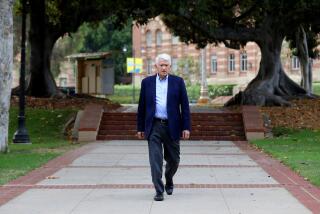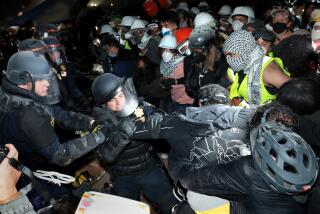University of Illinois-Chicago faculty may weigh into William Ayers fray
- Share via
Reporting from Chicago — Faculty leaders at the University of Illinois-Chicago are weighing whether to ask the board of trustees to reconsider its controversial decision to deny emeritus status to retired professor William Ayers.
It’s the latest twist in a showdown 40 years in the making between Ayers, a Vietnam War-era radical who later joined the university faculty, and Christopher Kennedy, the university’s board chairman, who was 4 when his father, Sen. Robert F. Kennedy, was assassinated.
With a passionate speech last week, Kennedy voted against Ayers’ appointment, saying he was guided by his conscience and could not support someone who had dedicated a book to the man who assassinated his father. The other trustees, without comment, also voted to deny the title to Ayers, a UIC education professor since 1987.
It is extremely rare for the board to comment on or vote against emeritus appointments.
Ayers was a cofounder of the Weather Underground group responsible for bombings of government buildings in the late 1960s and early 1970s. He became a controversial figure in Barack Obama’s presidential campaign because they worked on a school reform initiative together, leading opponents to accuse Obama of being linked to a “terrorist.”
Some university faculty members, writing on an internal faculty e-mail service, have expressed concerns that the board turned what should have been a routine academic decision into a personal one.
In a proposed resolution, Elliott Kaufman, a retired professor of biochemistry and molecular genetics, suggested that the Faculty Senate ask the board to reconsider.
“The chair had a conflict of interest and he put the other trustees in an impossible position,” he said in an interview. “He drew a dotted line between the assassination of the Kennedy brothers and giving Bill Ayers emeritus status. The result is what we got, and I just don’t think it was a fair way to do it.”
The university’s Senate Executive Committee will take up the issue next week, said committee Chairman Philip Patston, a professor of oral medicine.
Ayers has not responded to requests for comment since the decision was made. Kennedy did not return a call for comment Thursday and has said he would say nothing more on the issue.
Ayers retired last month and then sought the emeritus faculty status, a largely honorific title that includes benefits such as library privileges and a university e-mail account. According to the faculty handbook, the granting of emeritus status is “based on merit” and is “an extraordinary title that is given for extraordinary service.”
In voting against the appointment, Kennedy cited a 1974 book co-written by Ayers, “Prairie Fire,” which was dedicated to a long list of “political prisoners” including Robert Kennedy assassin Sirhan Sirhan. “There can be no place in a democracy to celebrate political assassinations or to honor those who do so,” he said.
Art history professor Peter Hales urged the Faculty Senate to ask the board to reconsider its decision and said that Ayers’ radical days predated his appointment at the university.
“I think of there being two Bill Ayers,” Hales said. “It is the second Bill Ayers that was hired by the university. He became a really important voice for social good at the point of education.”
jscohen@tribune.com
More to Read
Sign up for Essential California
The most important California stories and recommendations in your inbox every morning.
You may occasionally receive promotional content from the Los Angeles Times.













